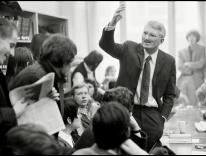President Barack Obama faces a choice in this tomorrow's State of the Union message: Does he spend the next two years consolidating the gains he has made, or does he go into retreat?
My prediction: He will go for consolidation that conservatives will try to label as retreat, even as they attack him for not retreating fast enough.
Obama will deliver his address Tuesday evening in an expectedly strong position. His approval ratings are rising and, at least according to an NBC News/Wall Street Journal poll, nearly as many Americans see him as moderate as view him as liberal.
The immense activity of the lame-duck congressional session is part of the resurgence—including the unfortunate tax deal that made everything else possible. So is the absence of tens of millions of dollars in Republican attack ads that dominated the airwaves before November's elections.
Then there was Obama's speech on the Tucson tragedy that allowed him to transcend partisanship. He spoke as a president and as a preacher—the latter a role he performs well (think of the 2004 Red and Blue America speech) but didn't play much in the last two years. Count on more preaching this week.
House Republicans are playing their own roles exactly as Obama would cast them. With their vote to repeal the Affordable Care Act, Republicans began their tenure on a negative footing, railing against what was done while offering nothing to put in its place. Whatever the problems with last year's law—and it is slowly gaining popularity as Americans look at what it actually does—the country does not see nothing as a realistic alternative.
Now Republicans are arguing over just how much they will cut from the federal budget, focusing less on specific programs to prune than on how big an ax they want to take to domestic government in general.
Here is Obama's big opportunity. The reasons behind Bill Clinton's comeback after the 1994 elections have been widely misread. He didn't kowtow to the new GOP Congress. He battled their cuts in "Medicare, Medicaid, education and the environment," and beat them. Republican overreach helped Clinton redefine the political center in a way that put the GOP's congressional leaders outside its ambit. Newt Gingrich and his followers then scrambled back Clinton's way, and that's when the deal-making began.
Obama will no doubt call for bipartisan cooperation to achieve long-term fiscal balance, but he should also be prepared to fight. With this crowd, his slogan should be: hope, but verify.
Obama's priority must be restoring robust growth and job creation. That is where the country's true center is—both politically and geographically.
The next election hangs on whether jobs are coming back to Pennsylvania, Ohio, Indiana, Illinois, Michigan, and Wisconsin. Count on Obama to talk about restoring American manufacturing.
Consider that Red and Blue America speech again. "We have more work to do," he said back in 2004, "for the workers I met in Galesburg, Illinois, who are losing their union jobs at the Maytag plant that's moving to Mexico, and now they're having to compete with their own children for jobs that pay seven bucks an hour." He warned against "blind optimism," defined as "the almost willful ignorance that thinks unemployment will go away if we just don't think about it." Smart guy, that young Obama.
It's also why any proposal to raise the Social Security retirement age is a nonstarter. There is no reason to waste political capital on Social Security cuts that would do nothing to close the nation's deficit within any reasonable time period.
On this issue, the Washington establishment is entirely out of touch with the heartland. It's easy for newspaper columnists, CEOs, investment bankers and senators to work beyond sixty-eight or seventy. It's not so easy for construction workers, nurses' aides, firefighters, or retail salespeople on their feet all day.
Some bipartisan work can get done on education reform and energy independence. And Obama should have the guts to call, at the very least, for a ban on those large gun magazines that made the slaughter in Tucson worse. Even Dick Cheney says he is open to that. A restoration of the assault-weapons ban would be better still.
If Obama's primary political goal is to keep himself in the ideological center, he has to work hard to define it his way. And, bless them, the House Republicans will be doing all they can to make Obama look like the soul of moderation and reasonableness.
(c) 2011, Washington Post Writers Group
